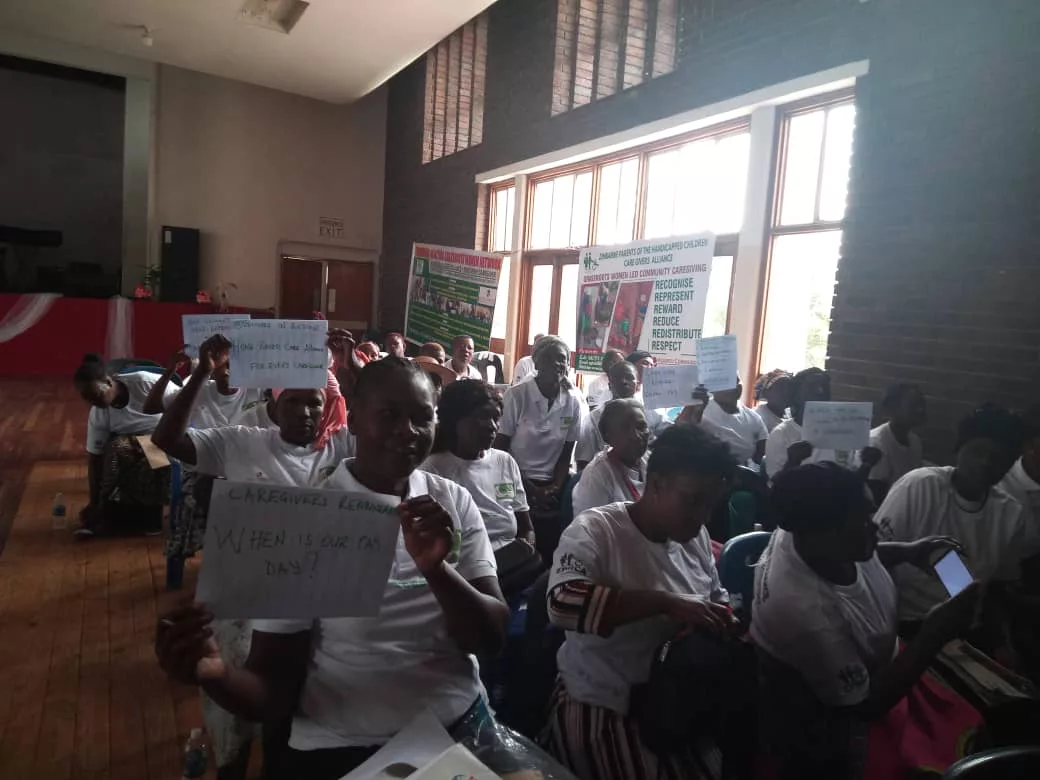|
Getting your Trinity Audio player ready...
|
The Zimbabwe Parents of Handicapped Children Association (ZPHCA) recently mobilized caregivers for a belated commemoration of the International Day of Care and Support to celebrate the important work of caregivers and the voluntary spirit and togetherness that defines this group of people.
Speaking to Spiked Online Media, during the event held in Waterfalls, Harare, Theresa Makwara, the ZPHCA Coordinator, said caregivers agreed that there is a need to mobilize other caregiver groups to come and join the growing Caregivers Alliance in Zimbabwe so that caregivers can continue to speak with one voice on priority issues.
“Caregivers agreed to undertake collective National Advocacy campaigns demanding recognition, remuneration, formalization, budgetary allocation and adoption of caregivers friendly laws and policies in Zimbabwe. They agreed that there is a need to mobilize men to join care work as a way of influencing the reduction of care workload on women and girls and also agreed to develop and maintain an institutional database of all active caregivers in Zimbabwe,” Makwara said.
There were various stakeholders in attendance. Participants included representatives from Government Departments, the City of Harare, traditional leaders, Survivors in Action Grassroots Women Network, Agriculture Extension Officers, the Business Community, church leaders, Faith Based Organizations, Organizations for Persons with Disabilities, Women Movements, and Caregiver Groups from Mbare, Hopley, Chitungwiza, Dema, Caledonia, Domboshawa, Eastview, Epworth, Kuwadzana and Highfield amongst other community groups.
This International Day of Care and Support was proclaimed by the UN General Assembly to be the 29th of October of each year beginning in 2023. The day seeks to recognise care work as a cornerstone to sustainable development and an accelerator for gender equality.
The Day allows stakeholders to make, renew, or enhance their commitment and take action to promote the rights of caregivers, care workers, and those receiving care and support.
The global care workforce comprises 249 million women and 132 million men. Women perform 76.2 percent of the total amount of unpaid care work, 3 times more time than men. Unpaid care work is care provided without a monetary reward by unpaid carers. Paid care work is performed for pay or profit by care workers. The care economy is growing as the demand for childcare, care for the terminally ill, care for persons with disabilities, care for those affected by disasters, and care for the elderly is increasing across the world. Care work is projected to create a great number of jobs in the coming years.
However, it is important to note that care work across the world remains characterised by a lack of benefits and protections, low wages or non-compensation, and exposure to physical, mental, and, in some cases, sexual harm.
“As stakeholders, we need to invest in the care economy, create robust, resilient and gender-responsive, disability-inclusive and age-sensitive care and support systems for the benefit of grassroots caregivers. We need to collectively work towards achieving the 5Rs of Care work to achieve (recognize, reduce care workload, reward, redistribute care work, and promote representation of caregivers in decision-making and policy-making processes).
“Care work disproportionately affects women and girls, further exacerbates gender inequality by limiting women’s ability to decide how to spend their time and their ability to participate in decision-making processes and occupy leadership positions, and poses significant constraints on women and girls’ education, economic opportunities and entrepreneurial activities. As we go back to our workstations as leaders in Government, Local Authorities, and Civil Society Organizations, let us go back and recognize and value care work and care workers and adopt measures that combat gender stereotypes related to care work,” Makwara added.






